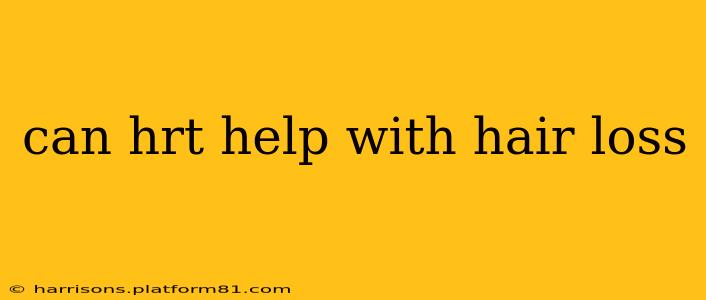Can HRT Help with Hair Loss? Understanding Hormone Replacement Therapy and Hair Growth
Hair loss, or alopecia, affects millions, and its causes are multifaceted. While genetics play a significant role, hormonal imbalances can also contribute significantly. This is where hormone replacement therapy (HRT) comes into the picture. But can HRT actually help with hair loss? The answer, unfortunately, isn't a simple yes or no. The effectiveness of HRT for hair loss depends heavily on the cause of the hair loss and the individual's specific hormonal profile.
What Causes Hair Loss in Women?
Before diving into HRT's role, it's crucial to understand the common causes of hair loss in women. Many factors can contribute, including:
- Androgenetic Alopecia (Female Pattern Baldness): This is the most common type of hair loss in women, characterized by thinning hair on the crown and widening of the part. It's linked to genetics and hormones, specifically androgens like dihydrotestosterone (DHT).
- Hormonal Imbalances: Fluctuations in estrogen, progesterone, and thyroid hormones can disrupt the hair growth cycle, leading to shedding. This can occur during pregnancy, menopause, or due to underlying medical conditions.
- Medical Conditions: Certain illnesses like polycystic ovary syndrome (PCOS), autoimmune diseases, and thyroid disorders can cause hair loss.
- Nutritional Deficiencies: Lack of essential nutrients like iron, zinc, and protein can impact hair health.
- Stress: Significant stress can trigger telogen effluvium, a temporary form of hair loss.
- Medications: Some medications can have hair loss as a side effect.
How HRT Works and Its Potential Impact on Hair Loss
HRT aims to replace hormones that are deficient in the body. In women experiencing menopause, this often involves supplementing estrogen and sometimes progesterone. The potential impact on hair loss is complex:
- Menopause and Hair Loss: The decline in estrogen during menopause can contribute to hair thinning. HRT can sometimes help mitigate this by restoring hormonal balance and potentially stimulating hair growth. However, it's not a guaranteed solution.
- Androgenetic Alopecia: HRT might not be effective for androgenetic alopecia, as the underlying issue is often an increased sensitivity to androgens, not necessarily a deficiency. In fact, in some cases, HRT might even worsen the condition.
- Other Hormonal Imbalances: If hair loss is linked to other hormonal imbalances, HRT might be beneficial in restoring normal hair growth once the underlying issue is addressed. This requires careful diagnosis and personalized treatment.
Can HRT Reverse Hair Loss?
While HRT can sometimes improve hair growth in women experiencing menopausal hair loss due to estrogen deficiency, it's unlikely to completely reverse significant hair loss. It's crucial to understand that it is not a guaranteed solution and may not be appropriate for all causes of hair loss.
What are the Alternatives to HRT for Hair Loss?
Several other treatments are available for hair loss, including:
- Minoxidil (Rogaine): A topical medication applied directly to the scalp.
- Finasteride (Propecia): An oral medication, typically prescribed for men, but may be considered in some women with androgenetic alopecia. Important Note: This medication is generally not recommended for women due to potential side effects.
- Hair Growth Supplements: Supplements containing biotin, zinc, and other nutrients may support hair health.
- Platelet-Rich Plasma (PRP) Therapy: A procedure involving injecting concentrated platelets from your own blood into the scalp to stimulate hair growth.
- Low-Level Laser Therapy (LLLT): Uses low-level lasers to stimulate hair follicles.
- Hair Transplantation: A surgical procedure to transplant hair follicles from one area of the scalp to another.
What are the Side Effects of HRT?
HRT can have several potential side effects, including:
- Increased risk of blood clots: This risk is greater for women who are smokers or have a history of blood clots.
- Breast tenderness: A common side effect.
- Headaches: Some women experience headaches while on HRT.
- Mood swings: Changes in mood are possible.
It's vital to consult a doctor or dermatologist to determine the cause of your hair loss and explore appropriate treatment options. They can assess your individual situation, weigh the risks and benefits of HRT, and recommend the most suitable approach, which may include HRT, other medications, or lifestyle changes. Self-treating hair loss can be risky, so professional guidance is crucial.
